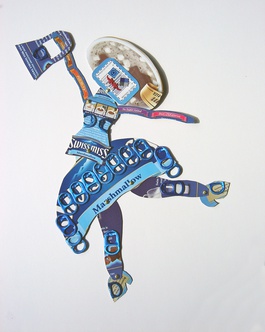
Battle of the Sexes: Madame? Or should I say, Mademoiselle?
Published on
Madame? Mademoiselle? Miss? Mrs? Most European languages offer numerous ways to greet a lady. But these salutations are far from neutral. They are all pregnant with implications of power relations, age and marital status. They serve to define the dynamic of the interaction. As such, many countries are simply doing away with them.
During a busy lunch hour in Paris, I was scarfing down my appetizer, as if my main dish could arrive at any moment, while my girlfriend across the table brought me up to speed on her new milestone as an apartment owner. As I listened, genuinely excited for her, I couldn’t help but interrupt and express my need for hot sauce.
“I’ll ask,” she said. Not that I can’t speak French, but we all know servers respond more readily to their fellow natives, than to an American who frequently demands all kinds of sauces during one meal sitting.
“Voila, madame.”
My friend stopped talking.
“What’s wrong?”
“He called me, madame.”
“So, what’ the matter?”
“Do I look that old?”
“No way. And anyway, I get called madame all the time.”
After this little incident, curious about my girlfriend’s position on titles and statuses as a woman, I was surprised to find out she is in favour of women and men having equal salutations and banning “mademoiselle.”
This is rather contradictory to say the least.
“I thought you were just offended at not being called miss?”
But I can’t blame her.
 Many women don’t want to be categorized as married or unmarried, but at the same time since the term “miss” exists, social norms have programmed the French to refer to a young lady as “mademoiselle” and an older (or at least older looking) woman “madame”. Though former Prime Minister Francois Fillon banned “mademoiselle” from government forms in early 2012, the term is still heavily present in the cultural setting, and not to forget, still used in private domains such as insurance or phone bills and magazine subscriptions. Now, an old, unmarried woman, “vieille fille,” or spinster, can be “madame,” or partially in some measures.
Many women don’t want to be categorized as married or unmarried, but at the same time since the term “miss” exists, social norms have programmed the French to refer to a young lady as “mademoiselle” and an older (or at least older looking) woman “madame”. Though former Prime Minister Francois Fillon banned “mademoiselle” from government forms in early 2012, the term is still heavily present in the cultural setting, and not to forget, still used in private domains such as insurance or phone bills and magazine subscriptions. Now, an old, unmarried woman, “vieille fille,” or spinster, can be “madame,” or partially in some measures.
In Germany, “fraulien” was banned in the 1970s and by the 1980s, the term was taboo in cultural settings. Where I come from, and in most anglophone countries, women have the option of “Ms” (married or unmarried) which allows us to choose to refrain from labeling. There is also “madam” or “ma’m” which are either old-fashioned expressions or indicative of great respect. The European Parliament banned both Miss and Mrs, citing sexism and pushed for the creation of a more “general neutral” language.
Wanting to better understand how the French feel about the change, I spoke with a handful of women and men. Their opinions were divided.
 Some women believe “mademoiselle” is a way to charm a pretty young lady and one woman in her late 20s believes it should be confined to the realm of seduction, even though she doesn’t want anyone to know about her age or marital status. My girlfriend, who was miffed about being called “madame” believes many social changes arise from laws and it will take time for “mademoiselle” to dissipate. Many of the men I spoke to couldn’t fathom the idea of referring to a young lady as “madame”. Some wanted to know why they can’t have a title equivalent to “mademoiselle” as they don’t feel like they’re ready to be “monsieur”. The terms “damoiseau” and “mondamoiseau” are archaic expressions for a young, unmarried male which never made it into official status. Nevertheless, “jeune homme,” meaning young man, is used in lieu.
Some women believe “mademoiselle” is a way to charm a pretty young lady and one woman in her late 20s believes it should be confined to the realm of seduction, even though she doesn’t want anyone to know about her age or marital status. My girlfriend, who was miffed about being called “madame” believes many social changes arise from laws and it will take time for “mademoiselle” to dissipate. Many of the men I spoke to couldn’t fathom the idea of referring to a young lady as “madame”. Some wanted to know why they can’t have a title equivalent to “mademoiselle” as they don’t feel like they’re ready to be “monsieur”. The terms “damoiseau” and “mondamoiseau” are archaic expressions for a young, unmarried male which never made it into official status. Nevertheless, “jeune homme,” meaning young man, is used in lieu.
France is not the only country where young women are still referred to with a traditional title. The Italians use “signorina” and the Spanish, “senorita” which, like the French “mademoiselle”, are used as forms of flattery or acquaintanceship.
This leads me to two conclusions; either countries like France and Spain are either very flirty or very traditional in their ways, or perhaps a hybrid of both. But maybe that’s soon to change?



